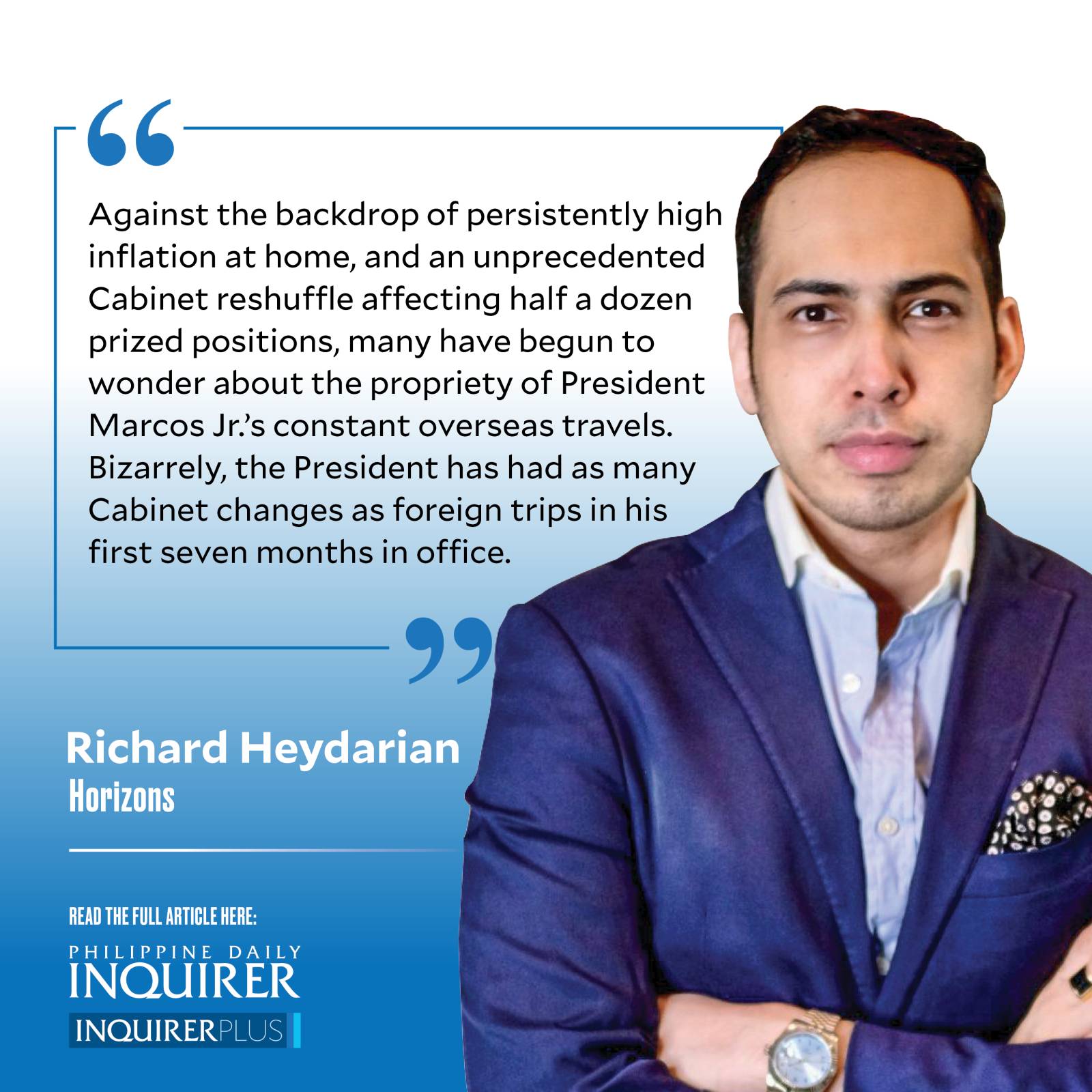Barely seven months into office, President Marcos Jr. embarked on his eighth international trip. Shortly after his maiden state visit to Beijing, he will spend this week in one of the most rarified corners of our beautiful planet. For a person who has claimed to have graduated with economics-related degrees from some of the most prestigious institutions on earth, attending this year’s World Economic Forum in Davos, Switzerland, must have been a dreamy moment.
It certainly helps that the Alpine resort town is surrounded by majestic mountains drenched in pure white snow. Mr. Marcos is reportedly the only leader from Southeast Asia to attend the uber-posh confab, where the world’s most influential businessmen, thinkers, policymakers, and journalists gather annually.
Given the high frequency of his overseas travels, including a surprise visit to the Formula 1 Grand Prix in Singapore last year, some netizens have begun to describe the President as Ferdinand “Magellan” Jr. (It goes without saying, though, that Ferdinand Magellan, notwithstanding his colonialist excesses, was a totally self-made man with world-renowned exploits.)
Against the backdrop of persistently high inflation at home, and an unprecedented Cabinet reshuffle affecting half a dozen prized positions, many have begun to wonder about the propriety of Mr. Marcos’ constant overseas travels. Bizarrely, the President has had as many Cabinet changes as foreign trips in his first seven months in office.
So, dear reader, let us briefly examine the merits and demerits of Mr. Marcos’ seeming penchant for “hyperdiplomacy.” A more sympathetic perspective would argue that the current president is simply airbrushing his predecessor’s undesirable legacy. After all, former president Rodrigo Duterte heavily undermined, despite his best intentions, the Philippines’ reputation among the respectable elements of the international community.
The list of policy blunders under the previous president is too long for this article, but here is a brief glimpse: A mindless “drug war” claiming thousands of lives with no sustainable results. Diplomatic subservience to authoritarian superpowers at the expense of trusted allies and friends. Puerile rhetorical outbursts coupled with toxic masculinity. And, lest we forget, the wholesale mismanagement of the COVID-19 pandemic, which triggered one of the deepest recessions in the whole developing world.
No wonder, then, Mr. Marcos made it clear during his first major overseas travel last year that he is determined to “reintroduce the Philippines” to the international community. His visits to the US and Europe helped restore frayed ties with traditional partners. And his dignified, statesmanlike behavior during global summits last November was a far cry from the Duterte era antics. And it must be said that Mr. Marcos, constantly accompanied by seasoned diplomats and accomplished technocrats, has had relatively succinct yet substantive speeches throughout all his foreign trips, so far.
During his first seven trips in office, Mr. Marcos reportedly secured $46.4 billion in investment pledges. The President has tried to justify his “jet-setter” schedule as the “best way to drum up business” for the country.
The problem, however, is that there is no credible evidence to suggest a strong correlation—never mind causation—between travel frequency of world leaders, on one hand, and investment inflow frequency, on the other.
First of all, Mr. Marcos has simply secured “pledges” of investments. It’s hard to say whether the $22.8 billion “pledges” he garnered in China weren’t simply a repackaged version of those offered to Duterte in 2016. After all, the $24 billion in investments promised to the former president went largely unfulfilled.
Moreover, all authoritative studies, whether by international financial institutions or leading scholars, show that the primary drivers of greenfield investments are more foundational factors such as good infrastructure, political stability, human capital, regulatory certainty, and market size. This is why, for instance, even if Vietnam’s top leader rarely travels abroad, his country is now a top investment destination.
Finally, there is also a need for transparency on the exact expenditures and size of the President’s delegations during overseas visits in order to ensure we avoid potential junkets—something a developing country grappling with high inflation can’t afford. In short, I’m all for rebranding the country after six years of populist disaster, but I’m not much given to performative diplomacy either. What we need is results-based, calibrated economic diplomacy that goes beyond resplendent overseas trips.
rheydarian@inquirer.com.ph
